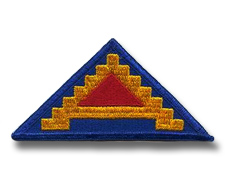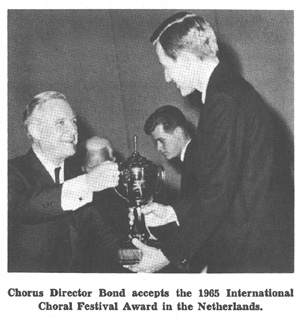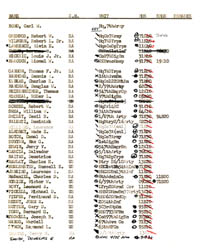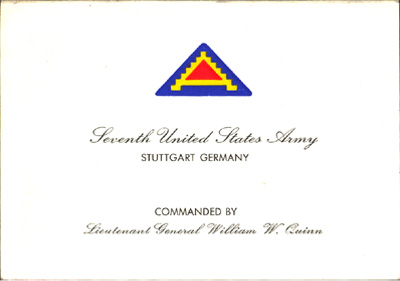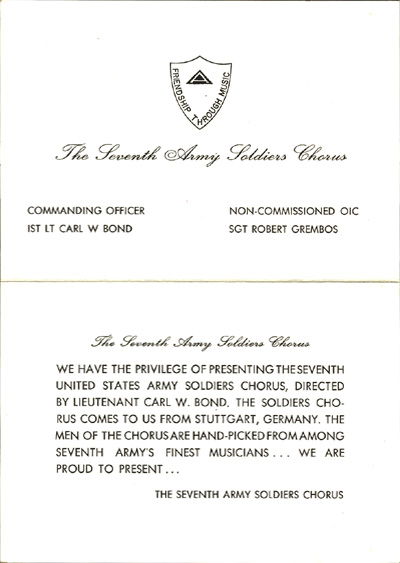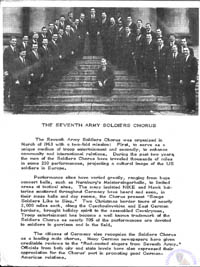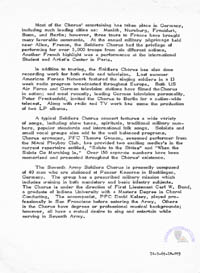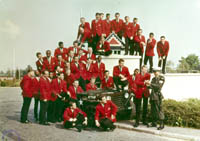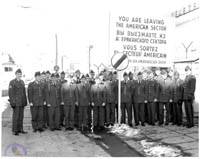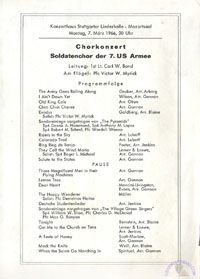|
Seventh
Army Soldiers Chorus |
|||||||||||||
|
|
|||||||||||||
|
|||||||||||||
|
|
|||||||||||||
| History | |||||||||||||
|
1963
- 19..
|
|||||||||||||
|
(Source:
Email from Robert Grembos, Soldiers Chorus)
|
|||||||||||||
| The Seventh Army Soldiers Chorus (SASC) began its history in 1963. We were based at Patch Barracks - Stuttgart. As the NCOIC for this unit from November 1963 until my rotation in June 1966 I have background on this unit's achievements. This includes Stars & Stripes stories, photos, show schedules, its International Choral Festival #1 finish in 1965 and more. Let me know if there is interest to include this history to this site. The activities the SASC are an important piece of 7th Army's history. I know that Gen Quinn (Seventh Army Commander) was very supportive of our efforts and in fact we were employed in 'dicey' military/civilian upsets to show the positive side of the US Military. |
|||||||||||||
| AMERICAN soldiers have been in Germany for over 20 years without pause; soon after hostilities ceased in 1945, American servicemen shed their rifles and helped to clear the rubble away as Germany began rebuilding. Since then, Seventh Army has worked closely with local Germans to achieve as great a harmony between soldier and civilian as possible. Individual efforts of soldiers continue to achieve better relations; but there are 36 soldiers in Seventh Army who especially excel in this mission. They are known throughout Germany by citizens and soldiers alike us the Seventh Army Soldiers Chorus... |
|||||||||||||
| (Source: Army in Europe publication, October 1965) | |||||||||||||
| Seventh Army Singing Soldiers by PFC Daniel D. Cotta It was no ordinary group of American soldiers who one evening last year wandered into Munich's well known Hofbräuhaus. They were a group of Seventh Army choristers, fresh from a concert at a nearby service club. Enjoying the atmosphere and the beer, the men broke into song. Soon their rich harmony on "In München steht ein Hofbräuhaus" (in full German text) had attracted several dozen German patrons, who gathered round the table. Nothing would do but that the group sing another German favorite, and then another. Finally, several steins later, the group completed the last few measures of "Auf Wiedersehn" and managed to tear themselves away. Men of the Seventh Army Soldiers Chorus are used to this kind of reception in Germany and other countries of Europe. When they open their mouths to sing, the Europeans listen and love it. They love it so much that, this past summer, the 36-man chorus won first-place trophy in the 1965 International Choral Festival, in competition with 75 singing groups from seven nations. It is the highest recognition that Europe can give a singing group. |
|||||||||||||
|
|||||||||||||
| The President of the festival called the Seventh Army group a "perfect chorus," and after the competition the judges asked for an encore. With the audience clapping hands and stomping feet to the rhythm of "The Army Goes Rolling Along," the chorus, dressed in red blazers, sang as it marched back on stage. After two more numbers, "Stout Hearted Men" and "Mack the Knife," the audience again gave a standing ovation. The story of the Seventh Army Soldiers Chorus is a story of the growth of a belief in what music can do. It is a story of the creation of a lasting musical friendship with hundreds of audiences across Europe. The idea for a soldiers chorus originated with Maj Gen William A. Harris, commander of the former Seventh Army Support Command. He wanted a symbol to represent the Support Command to his units, and America to the German community. In such a chorus he was convinced he had found the answer. |
|||||||||||||
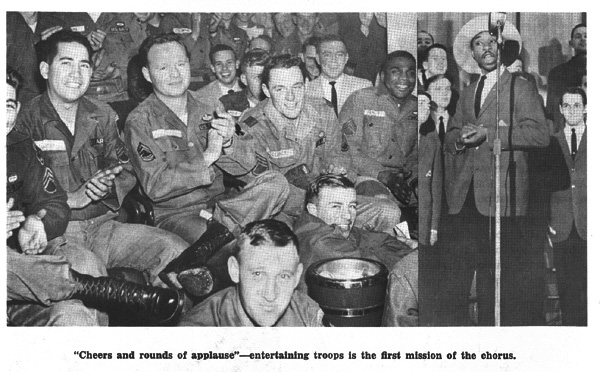 |
|||||||||||||
| Lt. Carl W. Bond, with a master's degree in choral conducting from Indiana State University and an extensive singing background of his own, was picked out as the ideal man to direct the new group. General Harris explained he wanted a chorus that would strive to be the finest. He charged the young lieutenant with his hopes of what the chorus could be. The Seventh Army Support Command Chorus gave its premier performance on 19 April 1963. Men from 33 different units blended voices in a musical commemoration of the American Civil War, arranged and directed by Lieutenant Bond. General Harris, staff officers, sergeants major and their wives rose in standing ovations -- and the chorus was on its way as troop entertainers and unofficial American ambassadors. They began a series of performances that has taken thousands of miles to missile sites and to border cavalry units -- where they have brought cheer to soldiers at Christmas time and to cities and villages throughout Germany. The aim has been "friendship through music." As Director Bond sees it, music is as important to the Army as its weapons. Music, he feels, can be be an international instrument of peace that can create a lasting friendship among nations. It can create a type of understanding that arms and force can never achieve, he says. It has a value entirely beyond any mere monetary worth. Not everyone has agreed with Bond. In its first year of singing, the future of the chorus hung in doubt. Some considered it more trouble than it was worth -- a waste of time, men and money. When the Seventh Army Support Command was inactivated, several officers advised that the chorus be scrapped. Lt. Gen. William W. Quinn, Commanding General of Seventh Army, listened to the chorus only once and then made up his mind. "You will sing for Seventh Army," he said. The singing soldiers were given a new home at Panzer Kaserne in Böblingen and became the Seventh Army Soldiers Chorus. In its role of troop entertainers," the chorus knows the songs soldiers like to hear -- typically American songs -- spirituals, folk songs, show tunes -- which bring the soldier in touch with home. A 30-minute "Salute to the States," a medley that bounces across the USA with a representative song from each state, always brings cheers and rounds of applause. Lieutenant Bond has a good knowledge of American music from early times to the present day. He's not just a folk music specialist, or a Civil War specialist, or a musical comedy specialist: he's all of them. His understanding of American music is reflected in the rich and far-reaching repertoire of the chorus. The handsome lieutenant with the broad smile has done considerable singing himself -- although he doesn't sing with the chorus -- and someday he would like to work professionally outside the Army. He and his wife were in Europe entertaining Army units in 1960, as members of the Indiana University "Singing Hoosiers." Bond realizes the value of what the chorus is doing and how important it is for members to be musically faultless. "America is always criticized because it's the biggest. For this reason it's especially important that we make a good showing," explains Bond. No matter how many times the chorus may have performed a certain number, they try to sing it each time as if it were the first. "Besides working for good sound and rich quality, we sing to bring out the message each song has to convey," Bond says. The Chorus has a quality, however, which can't be gained just by long hours of practice, a quality anyone watching and listening is quick to notice. Perhaps the best way to describe it is simply a pure joy in singing. They radiate it. As Lieutenant Bond conducts, with precise, smooth movements, standing far to the right ("it's the chorus people want to see -- not the conductor"), the singing soldiers charm and conquer their audience. The chorus members are thoroughly dedicated to the group. Many have sung in high school, college and church groups, have appeared in operas and musicals, and have done radio and television work. The group's pianist, PFC David A. Kelsey, comes from San Francisco, where he played professionally for six years before entering the Army. First tenor, PFC Demetrios Haitas, was a soloist with the University of Maryland Chapel Choir and sang with them at New York's Carnegie Hall. Assistant Director, PFC Roger L. Michael, has a master's in voice and has done considerable solo work. Chorus members are picked from Seventh Army units through auditions held twice yearly. |
|||||||||||||
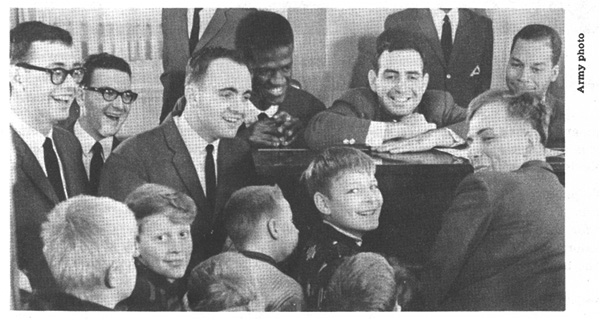 |
|||||||||||||
| Precision with Feeling To German audiences, the bravura of the chorus never fails to surprise and delight. They are intrigued by the red blazers and by the group's enthusiasm -- natural, but at the same time militarily crisp. The "redcoats" is the nickname they have given the Seventh Army singers, whose brightness is a new, unexpected contrast to the heavier, more traditional German choruses. "Fireworks of high spirits, reliable artistic skill and a shade of show business," said one German newspaper columnist after a concert this year in Kaiserslautern. Comments of other German reviewers ranged from "pure joy reigned among the audience" to "sparkling eyes, overwhelming happiness" and "spontaneous changes of expression like the precision maneuvers of an honor guard, with nothing out of place and no nervous gestures whatsoever." Singing in German, the chorus has developed the friendship, appreciation and admiration of the Germans. They have learned student medleys, Fasching (carnival) songs, and other traditional favorites. Knowing the language, Lieutenant Bond feels, shows an interest in the heritage of Germany and in the people themselves. One of the favorites of German audiences, and also a favorite of the chorus, is "Der fröhliche Wandersman" (The Happy Wanderer), which they sing in both German and English. The chorus is almost as heavily scheduled for German performances as it is for American military performances. It can pose a real problem of management, but the group has been fortunate over the past three years in having Lt David C. Klick as business manager, officer-in-charge, and liaison man. His social science, business and musical background from Oregon State University has served the chorus well. As if his administrative duties were not enough, Klick also sings first tenor. Free Weekend -- a Luxury The chorus members frequently mingle with their German friends after performances, becoming "ambassadors" not just as a group of singers, but also as individuals. And sometimes, when members of the chorus are "on the town," they'll give an unscheduled performance, as they did in Munich's Hofbräuhaus. But not all chorus life is so carefree. There are long hours of rehearsals, grueling schedules (this year during German-American week, the chorus presented twelve concerts in one week), and interminable bus rides. And, like any Seventh Army unit, the chorus has a military mission to fulfill. When not performing, they are billeted in Böblingen, Germany, and have a prescribed military mission. Director Bond feels it's vital for the chorus to maintain its soldierliness. "We're not civilians singing for the Army," he says. "These men are doing a job. Their job is entertaining. For them, a weekend off is a luxury." The chorus has succeeded in confirming General Quinn's faith in them. In addition to performing in Germany, they have broadened their friendship mission by means of concerts in France; they have done shows for the Armed Forces Network, have cut records, and, from Berlin, have appeared on nation-wide German television. In April, the chorus was named two-star winner in the annual parade of American music contest sponsored by the National Federation of Music Clubs and the Society of Composers, Arrangers and Publishers. The high point in their young career came with the victory in the International Choral Festival. The Seventh Army Soldiers Chorus hasn't known a defeat. With things going as they are, they may well stay on top. |
|||||||||||||
| 1. PROBLEM: to maintain and operate a Soldiers Chorus for Seventh Army while staying within directives and guidelines for manpower utilization from high headquarters. 2. DISCUSSION: 1. Mission: 2. Operations: 3. Procurement and Operations: 4. Supporting data: 3. CONCLUSION: The Soldiers Chrous retain basic method of operation with current strength authorization. Recommend the following provisisons be adopted to simplify the operation and bring it completely under Headquarters Seventh Army for ultimate control. |
|||||||||||||
(Source: Email from Robert Grembos, Soldiers Chorus) |
|||||||||||||
|
|||||||||||||
|
|||||||||||||
|
|
|||||||||||||
| Newspaper articles | |||||||||||||
|
|
|||||||||||||
| Related
Links |
|||||||||||||
